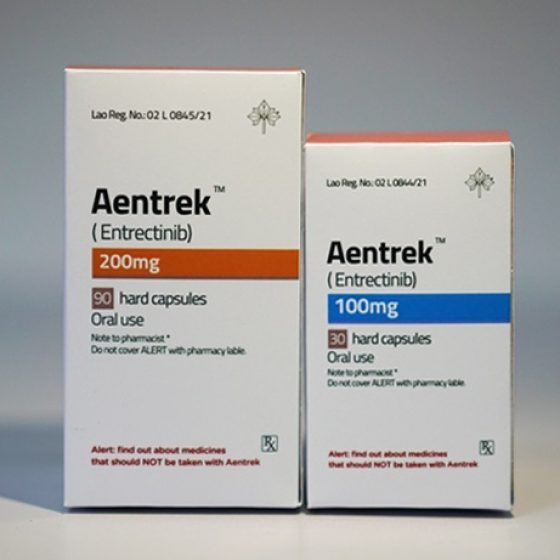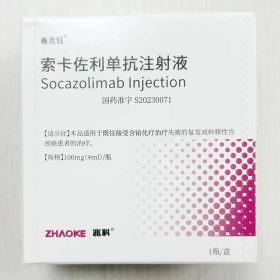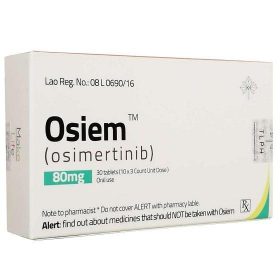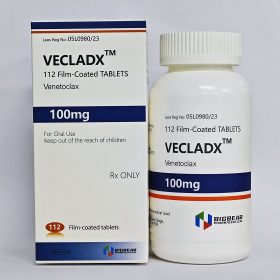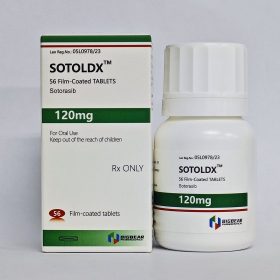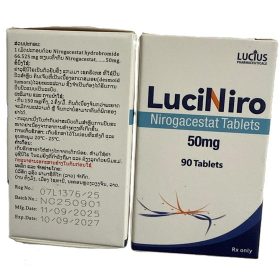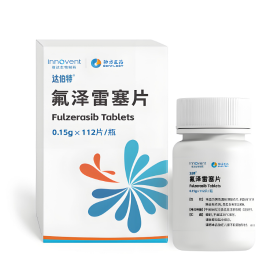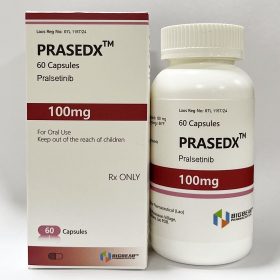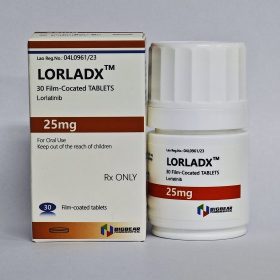- Details
- Description
-
Packaging Size100mg*30capsules/bottle
-
Strength100mg
-
CompositonEntrectinib
-
TreatmentTreat a certain type of non-small cell lung cancer (NSCLC) in adults that has spread to other parts of the body.
-
FormCapsule
-
BrandAentrek 100
-
Quantity Unit30Capsules/Bottle
-
ManufacturerTongmeng (Lao) Pharmaceutical & Food Co., Ltd.(TLPH)
Non-small Cell Lung Cancer
Indicated for metastatic non-small cell lung cancer (NSCLC) in adults whose tumors are ROS1-positive
600 mg PO qDay
Continue until disease progression or unacceptable toxicity
Neurotrophic Tyrosine Receptor Kinase Gene Fusion Solid Tumors
Indicated for patients with solid tumors that have a neurotrophic tyrosine receptor kinase (NTRK) gene fusion without a known acquired resistance mutation, are metastatic or where surgical resection is likely to result in severe morbidity, and progressed following treatment or have no satisfactory alternative therapy
600 mg PO qDay
Continue until disease progression or unacceptable toxicity
Dosage Modifications
Dosage modifications for adverse reactions
- First dose reduction: 400 mg qDay
- Second dose reduction: 200 mg qDay
- Permanently discontinue if toxicities persist or recur following 2 dose reductions
Congestive heart failure
- Grade 2 or 3: Withhold until recovered to Grade ≤1; resume at reduced dose
- Grade 4: Permanently discontinue
Central nervous system effects
- Intolerable Grade 2: Withhold until recovered to Grade ≤1; resume at reduced dose, as clinically appropriate
- Grade 3: Withhold until recovered to Grade ≤1; resume at reduced dose
- Grade 4: Permanently discontinue
Hepatoxicity
- Grade 3
- Withhold until recovered to Grade ≤1; resume at reduced dose;
- If resolution occurs within 4 weeks, resume at same dose
- If adverse reaction persists after 4 weeks, permanently discontinue
- For recurrent Grade 3 events that resolve within 4 weeks, resume at a reduced dose
-
Grade 4
- Withhold until recovered to Grade ≤1; resume at reduce dose;
- If adverse reaction does not resolve within 4 weeks or Grade 4 events recurs, permanently discontinue
-
Elevated ALT or AST
- ALT or AST >3x ULN with concurrent total bilirubin >1.5x ULN (in the absence of cholestasis or hemolysis): Permanently discontinue
Hyperuricemia
- Symptomatic or Grade 4: Initiate urate-lowering therapy; withhold until improvement of signs or symptoms; resume at same or reduced dose
QTc prolongation
-
QTc >500 ms
- Withhold until QTc interval recovers to baseline
- Resume at same dose if causes of QT prolongation are identified and corrected
- Resume at reduced dose if other causes of QT prolongation are not identified
-
Life-threatening arrhythmia
- Torsade de pointes; polymorphic ventricular tachycardia; signs/symptoms of serious arrhythmia: Permanently discontinue
Vision disorders
- Grade ≥2: Withhold until improvement or stabilization; resume at same dose or reduced dose, as clinically appropriate
Anemia or neutropenia
- Grade 3 or 4: Withhold until recovery to Grade≤2; resume at same or reduced dose, as clinically appropriate
Other clinically relevant adverse reactions
-
Grade 3 or 4
- Withhold until adverse reaction resolves to Grade 1 or baseline
- Resume at same or reduced dose if resolved within 4 weeks
- Permanently discontinue if adverse reaction does not resolve within 4 weeks or Grade 4 events recurs
Coadministration of moderate and strong CYP3A inhibitors
- Avoid coadministration
-
- Moderate CYP3A Inhibitors: 200 mg PO qDay
- Strong CYP3A Inhibitors: 100 mg PO qDay
- After discontinuation of strong or moderate CYP3A inhibitor for 3-5 elimination half-lives, resume entrectinib dose taken prior to initiating the CYP3A inhibitor
Renal impairment
- Mild-to-moderate (CrCl 30 to <90 mL/min): No dosage adjustment necessary
- Severe (CrCl <30 mL/min): Not studied
Hepatic impairment
- Mild (total bilirubin ≤1.5x ULN): No dosage adjustment necessary
- Moderate-to-severe (total bilirubin >1.5x ULN): Not studied; consider risk-benefit profile prior to determining whether to administer therapy to patients with moderate to severe hepatic impairment; monitor for adverse reactions in patients with hepatic impairment more frequently; these patients may be at increased risk for adverse reactions
Dosing Considerations
Patient selection
- NSCLC: Presence of ROS1 rearrangement
- Locally advanced or metastatic solid tumors: Presence of a NTRK gene fusion

